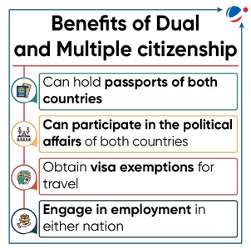DUAL CITIZENSHIP
- Recently the Union External Affairs Minister remarked that dual citizenship is a challenge in India.
- Dual or Multiple Citizenship: It grants an individual legal status as a citizen of two or more countries simultaneously.
- Countries offering dual citizenship: United States, Finland, Albania, Israel, and Pakistan, etc.
- The Indian Constitution prohibits dual citizenship for nationals.
- Alternative to dual citizens in India
- India offers the Overseas Citizenship of India (OCI) program to Persons of Indian Origin (PIO), excluding those who migrated to Pakistan and Bangladesh.
- Benefits for OCI cardholders
- Multi-purpose, multiple entry, lifelong visa for visiting India.
- Exemption from registration with local police authority for any length of stay in India.
- Parity with NRIs in respect of economic, financial, and education fields except in matters relating to the acquisition of agricultural/plantation properties.
- Foreign national eligible to apply for OCI
- Who was eligible to become a citizen of India on 26.01.1950.
- Was a citizen of India on or at any time after 26.01.1950.
- Who is a child or a grandchild or a great-grandchild of such a citizen given above.

- Tags :
- Citizenship
SUPREME COURT LEGAL SERVICES COMMITTEE (SCLSC)
- Recently, a Supreme Court judge has been nominated as the Chairman of the SCLSC.
- About SCLSC
- It is a statutory body.
- Constituted under section 3A of Legal Services Authorities Act, 1987 by National Legal Service Authority.
- Objective: Providing free legal services to poor, under-privileged and those marginalized in society.
- Chief Justice of India in Patron-in-Chief of Committee.
- It is a statutory body.
- Members: Chairman (sitting Judge of SC) and 9 members (nominated by the Chief Justice of India).
- Tags :
- Legal Services
SC ANNULS REMISSION IN BILKIS BANO CASE
- Supreme Court sets aside remission of 11 convicts in Bilkis Bano’s case given by Gujarat government
- SC held that Gujarat is not appropriate government to decide on remission petition as the trial was conducted in Maharashtra. Thus, remission orders were held to be invalid.
- Remission refers to reduction in period of sentence that has been imposed on a person, without affecting the nature of sentence.
- State may release convicts early under its remission policy.
- Constitutional provisions related to Remission
- Article 72 empowers President of India to grant pardons, reprieves, respites, suspend, remit, or commute the sentence of a person convicted of any offense where sentence is
- by a court Martial;
- for an offence against any law relating to a matter to which executive power of Union extends;
- a sentence of death.
- Under Article 161, Governor's power is similar to that of President, but limited to a matter to which executive power of state extends.
- Article 72 empowers President of India to grant pardons, reprieves, respites, suspend, remit, or commute the sentence of a person convicted of any offense where sentence is
- Legal basis of Remission
- Section 432 of Criminal Procedure Code (CrPC) 1973 grants government power to suspend or remit sentences.
- Section 433A mandates remission only after 14 years of imprisonment.
Supreme Court verdict on Remission
|
- Tags :
- Supreme Court
PANEL FOR EQUITABLE DISTRIBUTION OF BENEFITS AMONGST SCs
- Centre forms committee for the equitable distribution of benefits amongst Scheduled Castes (SCs) across the country
- Committee under Cabinet Secretary will formulate a methodology to ensure the fair distribution of benefits and initiatives among over 1,200 Scheduled Castes nationwide that have been crowded out by relatively forward ones.
- Although the committee cannot delve into questions of reservation, its constitution holds significance owing to the demand for sub-categorisation of SCs.
- A 7 judge Constitution bench of Supreme Court (SC) is set to hear if states have power to subcategorise SCs.
- Legal Precedents on Sub categorisation of SCs
- In E.V. Chinnaiah v State of Andhra Pradesh the SC held that the subcategorisation of SCs by State is violative of the right to equality as well as Article 341 of the Constitution.
- Article 341 gives the President the power to create a list of SC communities for reservation.
- In State of Punjab v. Davinder Singh (2020) SC held that deciding on the quantum of benefits in the lists of SCs/STs already notified would not amount to “tinkering” with it and States could do it.
- ‘Jarnail Singh v Lachhmi Narain Gupta 2018 the SC upheld the concept of “creamy layer” within SCs too (for reservation in promotion).
- Experts also believe that Article 16(4) of the Constitution already provided for States to create special laws for any backward classes it felt were under-represented.
- In E.V. Chinnaiah v State of Andhra Pradesh the SC held that the subcategorisation of SCs by State is violative of the right to equality as well as Article 341 of the Constitution.
- Tags :
- Scheduled Castes
MPLADS E-SAKSHI MOBILE APPLICATION
- MPLADS (Member of Parliament Local Area Development Scheme (MPLADS) e-SAKSHI Mobile Application
was launched by Ministry of Statistics and Programme Implementation (MoSPI) that allows MPs to propose, track, and oversee projects under MPLAD Scheme.
- About MPLADS
- Central Sector Scheme under MoSPI.
- MPLADS funds used for creation of durable community assets in areas of drinking water, primary education, etc.
- Atleast 15 percent of MPLADS entitlement allocated for areas inhabited by Scheduled Caste population and 7.5 percent for areas inhabited by ST population.
- Funds are non-lapsable i.e. if money is not utilised, it gets carried to next year.
- District authority must inspect atleast 10% of all work under implementation every year.
- Tags :
- MPLADS




SOCIAL AUDIT ADVISORY BODY (SAAB)